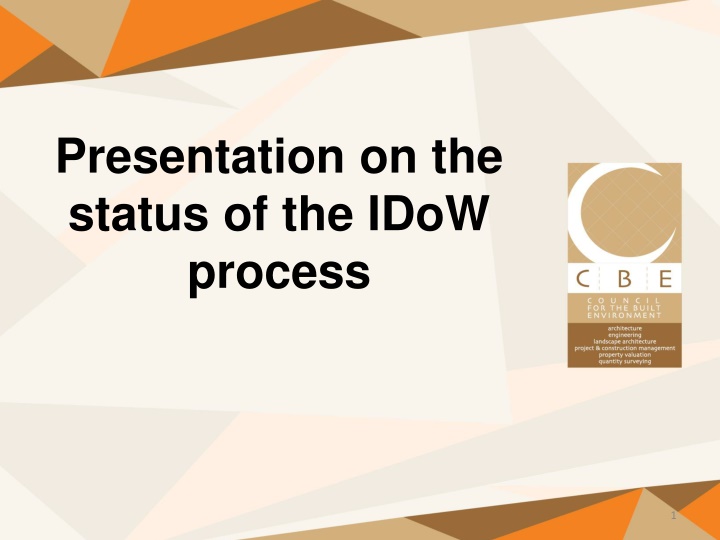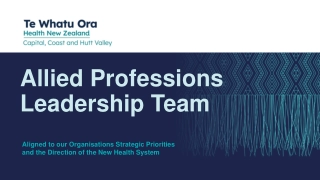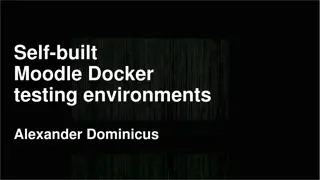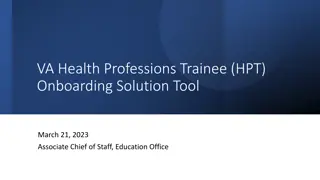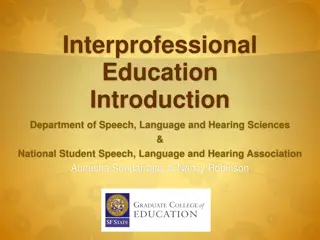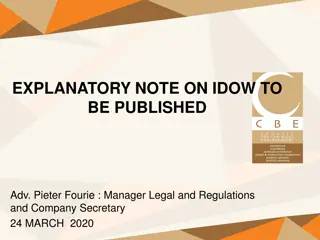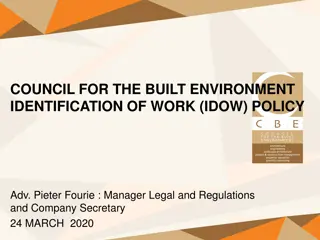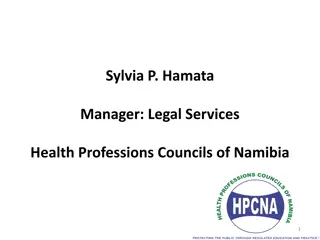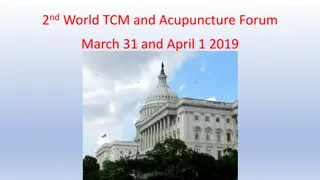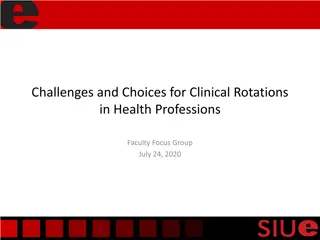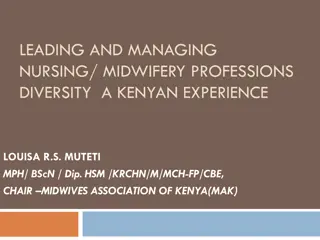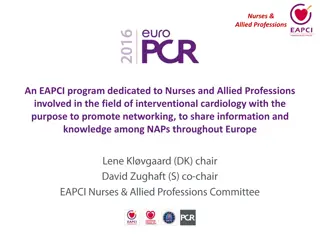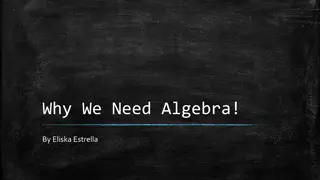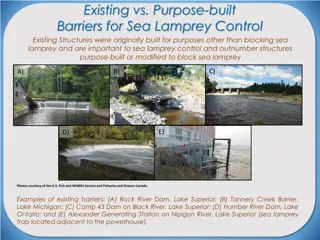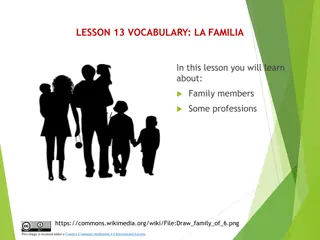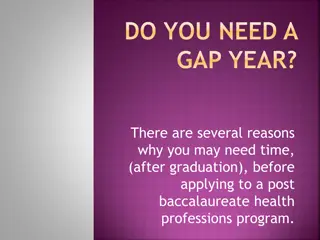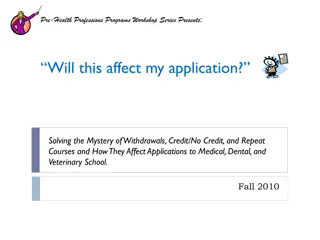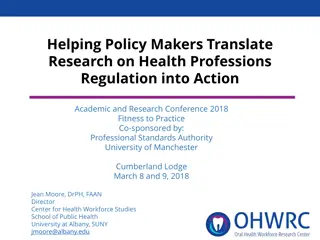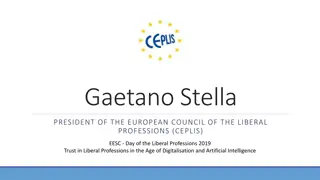Update on IDoW Process in Built Environment Professions
Presentation on the current status of the Identification of Work (IDoW) process as per the professions Acts and the Council for the Built Environment Act. It includes details on the reasons for rejecting exemption applications, consultation processes, scope of work identification, and international best practices in regulation. The presentation highlights the importance of regulating work in the built environment professions and the considerations involved in the decision-making process.
Download Presentation

Please find below an Image/Link to download the presentation.
The content on the website is provided AS IS for your information and personal use only. It may not be sold, licensed, or shared on other websites without obtaining consent from the author.If you encounter any issues during the download, it is possible that the publisher has removed the file from their server.
You are allowed to download the files provided on this website for personal or commercial use, subject to the condition that they are used lawfully. All files are the property of their respective owners.
The content on the website is provided AS IS for your information and personal use only. It may not be sold, licensed, or shared on other websites without obtaining consent from the author.
E N D
Presentation Transcript
Presentation on the status of the IDoW process 1
INDEX IDoW Process as per the professions Acts and the CBE Act The CC s reasons for rejecting the Exemption Applications Noting CC s mandate Current Status Scope of Work Status Update on planned activities Short term activities on IDOW and beyond 2
IDoW Process as per the professions Acts and the CBE Act 3
Section 26/27 (1) of the Professions Acts: The council must consult with (a) all voluntary associations; (b) any person; (c) any body; or (d) any industry, that may be affected by any laws regulating the built environment professions regarding the identification of the type of work which may be performed by persons registered in any of the categories referred to in section 18, including work which may fall within the scope of any other profession regulated by the professions Acts referred to in the Council for the Built Act, 2000. Environment Section 26/27 (2) of the Professions Act: After the process of consultation the council must submit recommendations to the CBE regarding the work identified in terms of subsection (1), for its consideration and identification in terms of section 20 of the Council for the Built Environment Act, 2000. Section 20 (2) of the CBE Act The council must, after consultation with the Competition Commission, and in consultation with the councils for the professions, identify the scope of work for every category of registered persons. Section 20 (1) of the CBE Act The council must, after receipt of the recommendations of the councils for the professions submitted to it in terms of the professions Acts, and before liaising with the Competition Commission in terms of section 4(q) (a) determine policy with regard to the identification of work for the different categories of registered persons; (b) consult with any person, body or industry that may be affected by the identification of work in terms of this section. 4
The CCs reasons for rejecting the Exemption Applications Restriction of competition between registered and unregistered professionals. Restriction of competition between professionals registered with different councils for the BE professions. Restriction of competition between professionals in the BE and professionals not in the BE. Restriction of competition between professionals registered with the same BE council but in different registration categories. International best practice The CC found that the regulation of BE professions a number of countries involves either the protection of title OR the protection of the practice of work , or both (i.e. total regulation). The CC conclude that the CBE exemption application on behalf of the councils for the BE professions opted for the most comprehensive approach, namely the total regulation (regulation of title, practice and the identification of work). Of the countries included in the CC s benchmarking sample, only Nigeria identifies work to the same extent. Other considerations: Resource constraints The CC found that the engineering sector is already experiencing resource restraints, and that any regulation that causes further strain to the resources in the sector is unwarranted. 5
The CCs reasons for rejecting the Exemption Applications (Conti.) Lack of consensus The CC found a lack of consensus between professionals registered in different categories; the persons registered in higher categories are more in support of IDoW than persons registered in the lower categories. Less harmful methods proposed The CC concluded that the IDoW application is exclusionary and will impact negatively on both registered and unregistered professionals. The CC recommended that less exclusionary regulatory methods in line with international best practice, such as the protection of titles, be considered. The CC also maintains the view that there are other legislations and provisions in place for the public protection ( e.g. The National Building Regulations, Electrical Installation Regulations, Mine Health and Safety Act, etc.). 6
NOTING THE CC MADATE The preamble of the Act (Competition Act) reads as follows: The people of South Africa recognise: That apartheid and other discriminatory laws and practices of the past resulted in excessive concentrations of ownership and control within the national economy, inadequate restraints against anticompetitive trade practices, and unjust restrictions on full and free participation in the economy by all South Africans. That the economy must be open to greater ownership by a greater number of South Africans. That credible competition law, and effective structures to administer that law, are necessary for an efficient functioning economy. That an efficient, competitive economic environment, balancing the interests of workers, owners and consumers and focussed on development, will benefit all South Africans. 7
NOTING THE CC MADATE (Conti.) In order to provide all South Africans equal opportunity to participate fairly in the national economy; achieve a more effective and efficient economy in South Africa; provide for markets in which consumers have access to, and can freely select, the quality and variety of goods and services they desire; create greater capability and an environment for South Africans to compete effectively in international markets; restrain particular trade practices which undermine a competitive economy; regulate the transfer of economic ownership in keeping with the public interest; establish independent institutions to monitor economic competition; and give effect to the international law obligations of the Republic. 8
NOTING THE CC MADATE (Continued) The purpose of the Act is to promote and maintain competition in the Republic in order to promote the efficiency, adaptability and development of the economy; to provide consumers with competitive prices and product choices; to promote employment and advance the social and economic welfare of South Africans; to expand opportunities for South African participation in world markets and recognise the role of foreign competition in the Republic; to ensure that small and medium-sized enterprises have an equitable opportunity to participate in the economy; and to promote a greater spread of ownership, in particular to increase the ownership stakes of historically disadvantaged persons. 9
NOTING THE CC MADATE (Conti.) The CBE Act impels the CBE to, after consultation with the Competition Commission (CC) and in consultation with the Councils for the Built Environment Professions (the CBEP), identify the scope of work for each category of registration (section 21 of the CBE Act). 10
Current Status The previous process Consequence Current process. Required outcome Professional rules require Determine policy with regard Compliance with Section 20(2) Development of draft exemption form the to the identification of work of the CBE Act; not requiring professional rules for provisions of the for the different categories of exemption applications. each CBEP Competition Act. registered persons. Exemption applications Consult with any person, Gain insight on the scope of Applied for exemption from were rejected by CC. body or industry that may be work for each category of the previsions of the affected by the identification registration and consequences Competition Act of work in terms of Section of identification of work to be 20(1) (b) of the CBE Act. considered. 11
Current Status The previous process Consequence Current process. Required outcome Granting of exemption not The identification of the scope Consultation in a legal Re-apply for exemptions guaranteed. of work for each category of sense, not obliging the CBE registration to accept the views of the CC. Consult with the CC on the identified scope of work. Finalize the identification of the scope of work for each category in consultation with the CBEP. Apply for a declaratory order, Follow the outcome of the Court ruling. on the CC s jurisdiction should CC insist on exemption applications. 12
SCOPE OF WORK The CBE has identified the scope of work to mean: the range of work performed by a registered person in terms of a specific piece of legislation other than the legislation that created the councils for the professions, or the statutory duties which may be performed by a registered person. 13
STATUS UPDATE ON PLANNED ACTIVITIES Goals 1. The CBE to confirm its IDoW Policy Deadline 7 June 2018 Done 7 June 2018 2. The CBE to invite CBEP to supplement their earlier IDoW recommendations. Done To commence on 27 July 2018 by placing an invitation for comments, with deadline 17 August 2018 3. The CBE to consult with any person, body or industry that may be affected by the identification of work. Ongoing 31 August 2018 4. The CBE to identify the scope of work for each category of registration. 5. Quarterly update of stakeholders on progress on the process Done 1. 30 September 2018 1 and 2 : Done 2. 30 December 2018 3. 31 March 2018 The process to commence on 19 September 2018 and conclude by 31 October 2018 6. The CBE to liaise with the Competition Commission on the identified scope of work for each category of registration. Running behind schedule. To commence in November 2018 (After consultation with the CC was concluded) and to continue until February 2019 March 2019 7. CBE to continue with consultation with CBEP on the outcome the CC consultation. Ongoing 7. Submit to Council second revised Action Plan informed by the CC and CBEP consultations On track. 14
SHORT TERM ACTIVIES ON IDOW AND BEYOND Submit to the CC the scope of work for each category of registration in a staggered manner, with an invitation to consult. Sought through the DPW engagement with the CC to reach a workable solution e.g, a Memorandum of Understanding on shared jurisdiction. CBEP to work towards an acceptable model of regulating professions, e.g. a balance between public interest (Protection of the public) and fair entry to the professions. The point above will essentially be the implementation of identification of work. 15
Thank You 16
